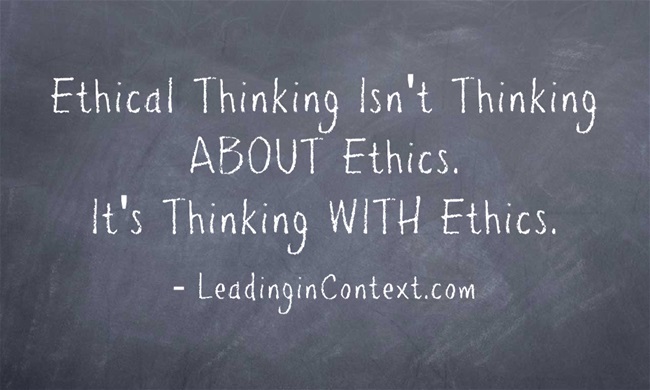
By Linda Fisher Thornton
To celebrate 7 Lenses going into its second printing (big news!), this is the first post in a special series focused on Why Ethical Thinking Matters. I’m hoping the strategies shared in this series will give you a fresh perspective on your talent development plans for 2018.
Ethical thinking drives ethical choices and behavior. Marcus Aurelius said “Our life is what our thoughts make it.” According to Buddha, “We are what we think. All that we are arises with our thoughts. With our thoughts, we make the world.” I believe that leadership development efforts must address the values-based thinking behind good leadership, or it will not lead to good leadership. If we just teach people skills, without upgrading their thinking, we are not preparing them for success in the real world.
Evidence Of The Gap: While most companies have stated values, one recent survey found that less than half of them actively lead with those values. According to Salesforce.com, The Impact of Equality and Values Driven Business, “Although 10 out of 18 senior executives surveyed at the 2017 New York Times New Work Summit said that their companies clearly define their values, only 40% of business professionals say their company leads with its values.”
You may already realize that ethical thinking is important, and if you do, I ask you to spread the word. To help you champion the cause in your organizations and on social media, I have included the business case below.
Leaders need to learn how to think WITH values so they can APPLY them to their daily challenges.
We need to help leaders ramp up their thinking skills to be able to successfully APPLY positive ethical values to increasingly complex situations. If we don’t, they’ll still have to make leadership decisions every day, but those decisions may not align with our organization’s ethical values. They may not meet the ethical expectations of customers, employees and other key stakeholders. And even though they’re in leadership positions, they won’t be ready to teach the organization’s values to their teams.
Helping leaders learn ethical thinking means they will be able to APPLY ethical values in their daily decisions and actions. That ability brings many positive benefits to the organization, including:
Improved Positive Outcomes, Reduced Risk
“Ethical leadership has been shown to cause a host of positive outcomes, and to reduce the risk of many negative outcomes. Leadership may therefore be the most important lever in an ethical system designed to support ethical conduct.”
EthicalSystems.org, Leadership
Competitive Advantage
“Virtuous organizations, like virtuous people, outperform their peers over time. The ethical values guiding the world’s most successful organizations are cheap but powerful sources of competitive advantage.”
SHRM, Shaping an Ethical Workplace Culture
Improved Connection With Customers and Employees
“Business leaders who take the next step to not only define but actually lead with values are better positioned to connect with their customers and employees.”
Salesforce.com, The Impact of Equality and Values Driven Business
Improved Trust, Which Drives High Performance
“Simply put: High ethics creates high trust. High trust creates high performance.”
SHRM, Shaping an Ethical Workplace Culture
Only when leaders learn to think using ethical values will they be able to successfully apply those ethical values to their decisions and action, every day.
Read the next post in the series: Why Ethical Thinking Matters (Part 2)
©2018 Leading in Context LLC

Congratulations! Well deserved!
Cam
LikeLike